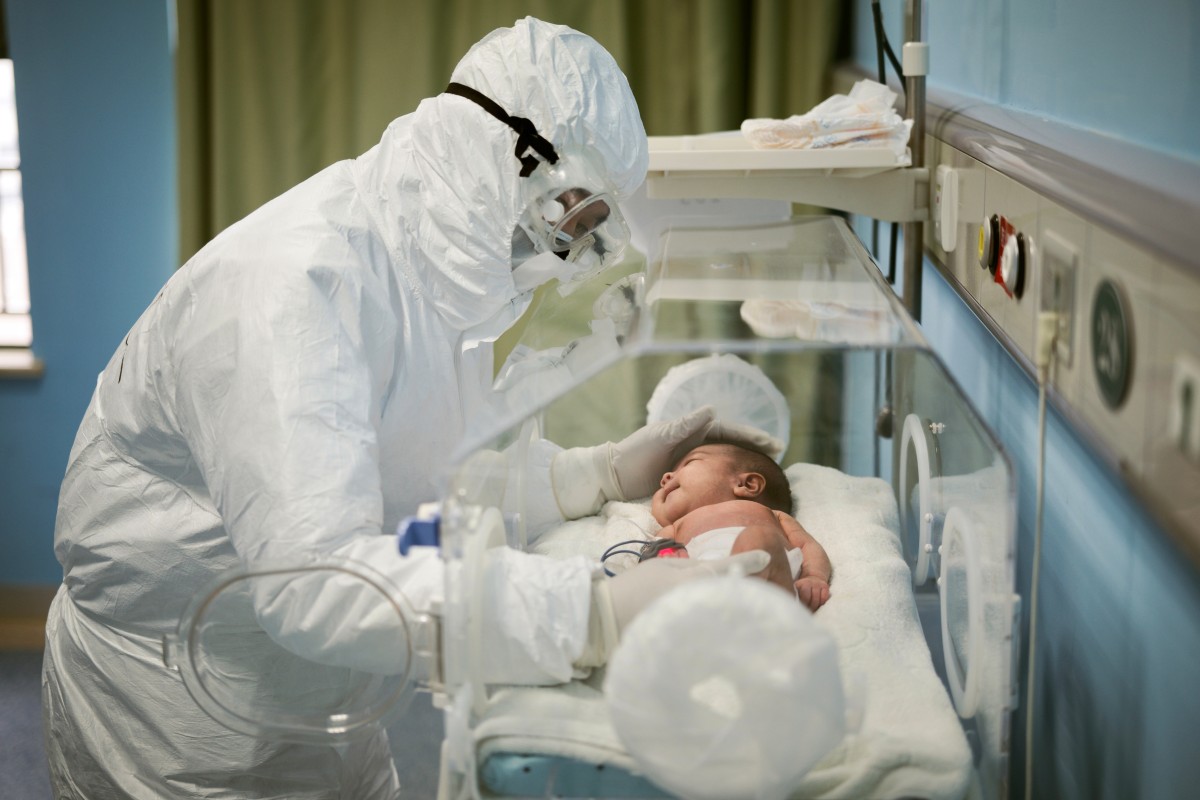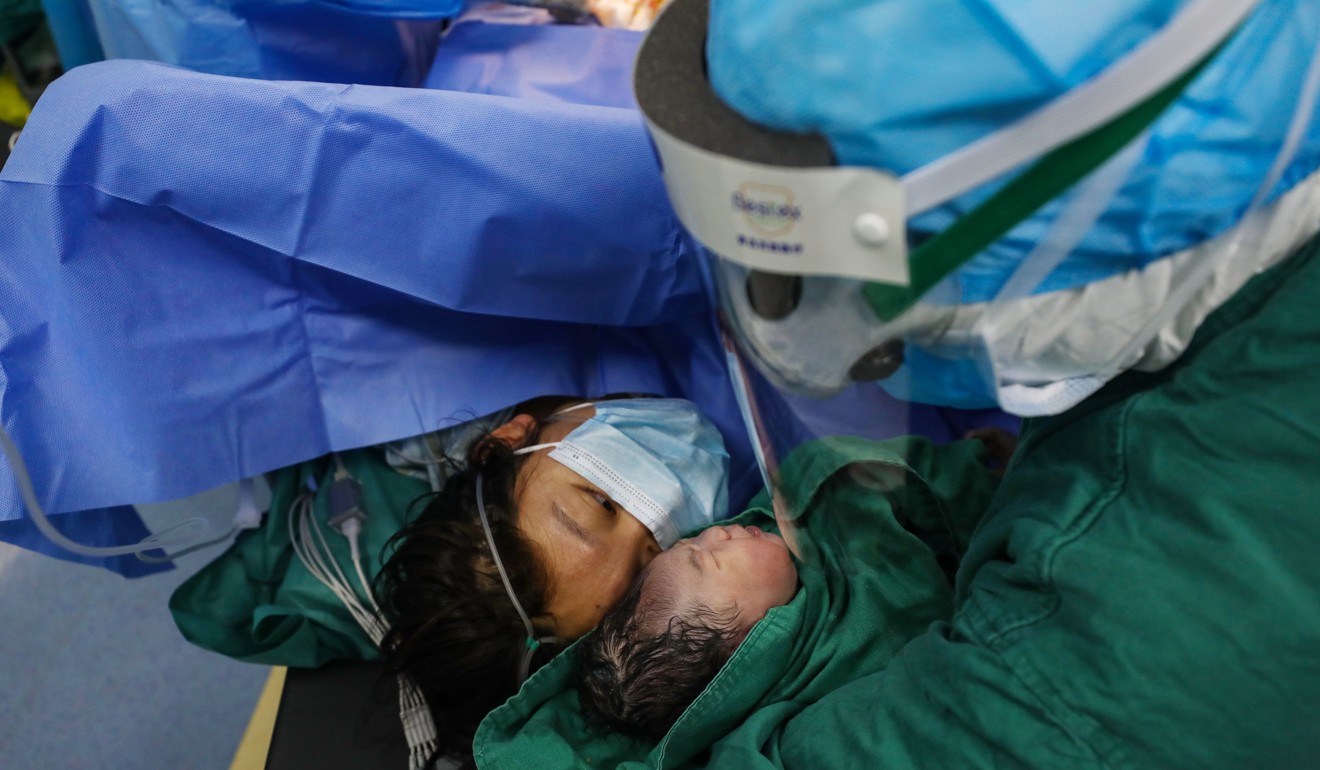
With proper treatment pregnant women infected with Covid-19 appear to survive better than those with Sars infection, but more research into mother-to-baby transmission needs to be done, according to a paper by doctors in Wuhan.
“In our study, the maternal, fetal and neonatal outcomes of pregnant women with Covid-19 pneumonia seem to be better than those with severe acute respiratory syndrome [Sars] infection,” the authors wrote in the research paper published in The Lancet medical journal on Tuesday.
The study included seven pregnant women infected with Covid-19. The women were all in their third trimester of pregnancy and were admitted to Tongji Hospital in Wuhan between January 1 and February 8.
The paper is among the first to report on the effects of the virus on pregnant women in their third trimester. It found “good outcomes for both mother and infant”.
The Sars outbreak, starting in 2003, affected more than 8,000 people from 29 different countries and territories and caused at least 774 deaths worldwide.
The mortality rate of the general population infected by Sars was 10 per cent, while that of patients infected with Covid-19 is 1-4 per cent.

The mortality rate of pregnant women infected with Sars was 25 per cent, wrote the six doctors from Tongji Hospital, which has been treating Covid-19 patients since the outbreak started in December.
None of the Covid-19 cases in the Wuhan pregnancy study was severe and their infants were largely healthy, wrote the authors who include leading paediatrician Yu Nan and gynaecologist Lin Xingguang.
The doctors noted that patients might experience a more rapid clinical deterioration with altered hormone levels and lower lung volume caused by the increased uterus size during pregnancy. But the doctors were satisfied with the recovery of the seven patients studied and identified quick delivery, oxygen therapy, antiviral treatment and a multidisciplinary team as some of the key measures taken.
The pregnant Covid-19 patients showed “a pattern of clinical characteristics similar to those reported in non-pregnant adults”, the authors wrote, with fever and cough being the most common symptoms, and diarrhoea and shortness of breath among the less common symptoms.
The doctors also said that all seven patients studied had delivered their babies by caesarean.
“Therefore, for full-term pregnant women, after consultation with a multidisciplinary team, delivering as soon as possible might be a better choice for the sake of safety considerations,” they wrote.
The authors said all patients had received oxygen therapy via nasal catheter in isolation. Antiviral and antibiotic treatments with traditional Chinese medicines had been administered to all of them.
Of the seven infants delivered in the hospital, four were taken home and were not tested for Sars-CoV-2, the virus causing Covid-19 outbreak, because they did not have symptoms. Among the three infants tested, two returned negative results.
One tested positive at 36 hours after birth. However, the viral nucleic acid tests of the placenta and cord blood were negative, “suggesting vertical transmission might not have occurred”.
This incident was first reported on China’s state-run CCTV on February 6, raising concerns about Covid-19’s potential vertical transmission, or virus transmission from mother to baby during pregnancy or childbirth.
The newborn returning a positive result is one of two neonatal Covid-19 cases reported in China. The other involved a 17-day-old infant in Shanghai. That baby had a close contact with two confirmed cases, the baby’s mother and maternity matron.
The infant in the study had been observed to have mild shortness of breath symptoms but no fever and cough, said doctors, and was discharged after two weeks following two negative nucleic acid test results.
So far, the doctors in China have been cautious about drawing conclusions.
In The Lancet on February 12, Qiao Jie, a doctor from Peking University Third Hospital in Beijing, said “no reliable evidence is as yet available to support the possibility of vertical transmission of Covid-19 infection from the mother to the baby”.
Qiao helped combat the Covid-19 contagion in Wuhan but was not involved in the study,
Previous studies published after the Sars outbreak showed no evidence of mother-baby vertical infection.
A Shanghai-based obstetrics expert said there was no evidence that coronavirus could be contracted in the womb but the possibility of transmission from an infected mother infected to her baby could not be excluded. Huang Hefeng is president of the International Peace Maternity & Child Health Hospital of China welfare institute (IPMCH).
She was not involved in the study published in The Lancet but is conducting a similar study based on clinical records from Wuhan.
“All the mothers are coronavirus patients with mild symptoms and the vital signs of their babies were stable when they were born,” Huang said, adding that doctors did not find the coronavirus in placenta, amniotic fluid or cord blood in these cases.
“For the infant having tested positive for the coronavirus, we can’t tell whether the infant contracted the virus from its mother or from air after it was born because the test was carried out several days after its birth,” she said.
Huang, who is also an academic at the Chinese Academy of Sciences, did not release further details of the as yet unpublished study.
Huang said some women in Wuhan with mild coronavirus symptoms and in the early stages of pregnancy had had abortions because they feared their baby was endangered.
She did not advise abortion in these cases; instead, doctors should apply “relatively mild” treatment and avoid using drugs that would harm the fetus.
“For women at their late stage of pregnancy, my advice is that they give birth to their babies once the fetus is mature,” Huang said.
“It’s because the vital capacity of this group of women [at their late stage of pregnancy] is affected due to their bigger and bigger belly. There is a high risk for them to develop into serious symptoms [of the coronavirus].”







